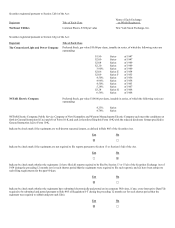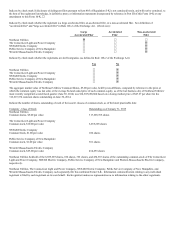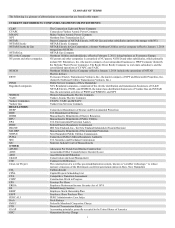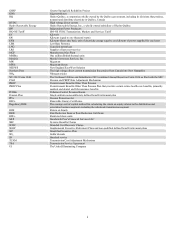Eversource 2014 Annual Report Download - page 18
Download and view the complete annual report
Please find page 18 of the 2014 Eversource annual report below. You can navigate through the pages in the report by either clicking on the pages listed below, or by using the keyword search tool below to find specific information within the annual report.6
NSTAR Electric continues to supply approximately 44 percent of its customer load at basic service rates while the other 56 percent of its customer
load has migrated to competitive energy suppliers. WMECO continues to supply approximately 51 percent of its customer load at basic service rates
while the other 49 percent of its customer load has migrated to competitive energy suppliers. Because customer migration is limited to energy supply
service, it has no impact on the delivery business or operating income of NSTAR and WMECO.
The rates established by the DPU for NSTAR Electric and WMECO are comprised of the following:
A basic service charge that represents the collection of energy costs, including costs related to charge-offs of uncollected energy costs from
customers. Electric distribution companies in Massachusetts are required to obtain and resell power to retail customers through basic
service for those who choose not to buy energy from a competitive energy supplier. Basic service rates are reset every six months (every
three months for large commercial and industrial customers). Additionally, the DPU has authorized NSTAR Electric to recover the cost of
its Dynamic Pricing Smart Grid Pilot Program through the basic service charge. Basic service costs are reconciled annually.
A distribution charge, which includes a fixed customer charge and a demand and/or energy charge to collect the costs of building and
expanding the infrastructure to deliver power to its destination, as well as ongoing operating costs.
For WMECO, a revenue decoupling adjustment that reconciles distribution revenue, on an annual basis, to the amount of distribution
revenue approved by the DPU in its last rate case in 2011. Currently, WMECO is allowed to collect $132.4 million annually.
A transmission charge that recovers the cost of transporting electricity over high voltage lines from generating plants to substations,
including costs allocated by ISO-NE to maintain the wholesale electric market.
A transition charge that represents costs to be collected primarily from previously held investments in generating plants, costs related to
existing above-market power contracts, and contract costs related to long-term power contract buy-outs.
An energy efficiency charge that represents a legislatively-mandated charge to collect costs for energy efficiency programs.
Reconciling adjustment charges that recover certain DPU-approved costs as follows: pension and PBOP benefits, low income customer
discounts, lost revenue and credits associated with net-metering facilities installed by customers, storms, consultants retained by the
attorney general, and energy efficiency programs and lost base revenue not recovered in the energy efficiency charge. In addition to these
adjustments common to both NSTAR Electric and WMECO, NSTAR Electric has reconciling adjustment charges that collect costs
associated with certain safety and reliability projects, a Smart Grid pilot program, and long-term renewable contracts. WMECO has a
reconciling adjustment charge that recovers costs associated with certain solar projects owned and operated by WMECO.
As required by regulation, NSTAR Electric and WMECO, along with two other Massachusetts electric utilities, signed long-term commitments to
purchase a combined estimated generating capacity of approximately 334 MW of wind power from two wind farms in Maine over 15 years. The
projects are in various stages of permitting or development and are expected to begin operation in 2015 and 2016.
Pursuant to a 2008 DPU order, Massachusetts electric utilities must adopt rate structures that decouple the volume of energy sales from the utility's
revenues in their next rate case. WMECO is currently decoupled and NSTAR Electric will propose decoupling in its next rate case.
NSTAR Electric and WMECO are each subject to service quality (SQ) metrics that measure safety, reliability and customer service, and could be
required to pay to customers a SQ charge of up to 2.5 percent of annual transmission and distribution revenues for failing to meet such metrics.
Neither NSTAR Electric nor WMECO will be required to pay a SQ charge for its 2014 performance as each company achieved results at or above
target for all of its respective SQ metrics in 2014.
Sources and Availability of Electric Power Supply
As noted above, neither NSTAR Electric nor WMECO owns any generation assets (other than WMECO's solar generation), and both companies
purchase their respective energy requirements from a variety of competitive sources through requests for proposals issued periodically, consistent
with DPU regulations. NSTAR Electric and WMECO enter into supply contracts for basic service for 50 percent of their respective residential and
small commercial and industrial customers twice per year for twelve month terms. Both NSTAR Electric and WMECO enter into supply contracts
for basic service for 100 percent of large commercial and industrial customers every three months.
ELECTRIC DISTRIBUTION –NEW HAMPSHIRE
PUBLIC SERVICE COMPANY OF NEW HAMPSHIRE
PSNH's distribution business consists primarily of the generation, delivery and sale of electricity to its residential, commercial and industrial
customers. As of December 31, 2014, PSNH furnished retail franchise electric service to approximately 504,000 retail customers in 211 cities and
towns in New Hampshire, covering an area of approximately 5,630 square miles. PSNH also owns and operates approximately 1,200 MW of
primarily coal-and oil-fired electricity generation plants. PSNH's distribution business includes the activities of its generation business.
The Clean Air Project, a wet flue gas desulphurization system (Scrubber), was constructed and placed in service by PSNH at its Merrimack Station in
2011. Tests to date indicate that the Scrubber reduces emissions of SO2 and mercury from Merrimack Station by over 90 percent, which is well in
excess of state and federal requirements. PSNH is permitted to recover prudent Scrubber costs through its ES rates under New Hampshire law. In
























